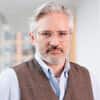A cantor at the Cathedral of Our Lady of the Angels led the congregation in a haunting refrain during a special Mass this week for victims and first responders of the Los Angeles wildfires: “Lord, every nation on earth will adore you.”
The fires in Los Angeles County continue to burn, so the extent of the damage is uncertain. Still, it’s clear a number of houses of worship have been destroyed or damaged, among them Corpus Christi Catholic Church in the Pacific Palisades.
Churches, synagogues and mosques become important touchstones in communities ravaged by disasters – now many here are also themselves victims of a disaster.
Calvary Church of Pacific Palisades, an evangelical congregation on the west side of Los Angeles, was badly damaged. Lead pastor Justin Anderson called the sanctuary “a near total loss.”
He says both of his associate pastors also lost their homes in the fires.
“There is a level and a kind of scope of destruction here that nobody in this community has ever dealt with before,” Anderson said.
The Parish of St. Matthew, a large Episcopal congregation in the Palisades, was also badly damaged. The church is the spiritual home to about 500 families, according to the church’s rector, the Rev. Bruce Freeman. He said eight of the 21 parish buildings on the large campus are still standing.
Among the buildings that did survive there is the main sanctuary, which last burned down in 1979 during a wildfire, said Freeman.
He and his two associate rectors all lost their homes, which were parsonage buildings on St. Matthew’s campus. And Freeman says about three-quarters of his congregation had their homes destroyed as well.
The Palisades Fire also leveled the Chabad Jewish congregation’s building Tuesday evening.
Among the houses of worship that were destroyed by the Eton Fire north of Los Angeles: Altadena United Methodist Church, Altadena Community Church, and Masjid Al-Taqwa.
The Pasadena Jewish Temple and Center also burned down, but the congregation was able to rescue the Torah scroll from the building, according to Rabbi Noah Farkas, president of the Jewish Federation of Los Angeles.
He said the building had a long history in the community, and the congregation is resilient.
“The fire will come and go, but I think the community will last forever,” he said. “So this is a moment in time, but it doesn’t define who we are.”
The Chabad in Pacific Palisades was also able to save its Torah scroll.
Churches, mosques and synagogues often function as more than places of prayer in their neighborhoods, serving as community centers and more.
The Parish of St. Matthew and Calvary Church in the Pacific Palisades both ran schools.
St. Matthew has one of the largest Boy Scout troops in the L.A. area, producing more than thirty Eagle Scouts in recent years, according to Rev. Freeman. It also hosts speaker series, concerts and other arts events.
Importantly, many congregations are also home to Alcoholics Anonymous and other 12-step meetings. So, when a neighborhood loses a church or synagogue or mosque it’s losing more than a place people go to pray. It’s losing a place to learn and recover and enjoy life.
When disasters like hurricanes or wildfires happen, people often ask “How could God let this happen?” Answers to that question from the leaders of congregations in the Los Angeles area are as diverse as the beliefs among their houses of worship.
Anderson, of the evangelical Calvary Church, said humans cannot comprehend the ways of God.
“It is not chaos. It’s God’s work,” he said. “And even if we don’t understand it — don’t know it — we can find solace in that.”
While Anderson focuses on God’s sovereignty in times of disaster, the Rev. Bruce Freeman from St. Matthew’s Episcopal Church said God’s compassion should take central place.
“If you believe God is in Jesus, then you’ve got to believe God suffers with us,” he said. “That’s our hope too. That’s what we hang on. Because there will be resurrection.”
Rabbi Noah Farkas of L.A.’s Jewish Federation offered another way of thinking: that God does not send disasters like wildfires but rather gives people to each other in the midst of sorrow and loss.
“Where I find God is not in the reality of what it means to live in a frail and mortal universe,” he said.
“I find God in the response to those tragedies — in those folks who open their doors and say I don’t know you but I’m going to support you. What can I do to help?”
Source: www.npr.org
